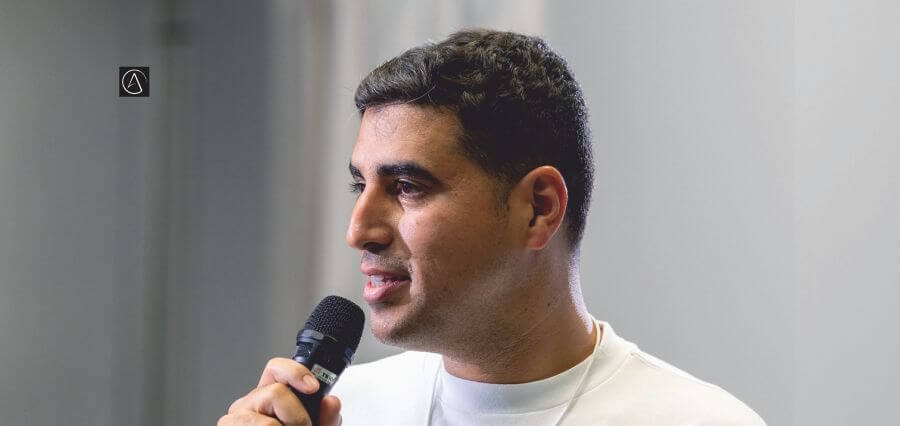A pioneering force in the development of the Arabic gaming market is Hussam Hammo, the CEO and Founder of Tamatem Games. His story is an inspiring tale of vision, determination, and a deep dedication to technological advancement and cultural heritage. Hammo’s journey is not simply about establishing a thriving business—it is about developing opportunities, conserving language, and motivating a future generation of business leaders in the Middle East. His life, characterized by aggressive moves and unshakeable confidence in the future of the region, has important lessons for anyone who cares about the confluence of business, technology, and culture.
Early Life and Educational Foundation
Hammo’s journey started in Jordan, where he was introduced to technology at a young age. He studied computer science and graduated in 2005, then dove straight into the local startup ecosystem. Between 2005 and 2007, he worked for a Jordanian startup, getting firsthand experience in the fast-paced and sometimes unpredictable nature of entrepreneurship. It was a defining time, where he learned to appreciate adaptability, teamwork, and perseverance—qualities that would eventually characterize his leadership style.
First Steps: Social Networking and Early Entrepreneurship
Hammo made his first serious entrepreneurial step in 2007 by establishing Faye3.com, a social network written in Arabic. The site quickly picked up speed and was purchased by Maktoob.com, a well-known Jordanian technology firm. Hammo moved to Maktoob, where he headed the social department from 2007 until 2009. It was here that he gained a deep understanding of working with teams, scaling products, and working within the nuances of the local tech ecosystem.
The First Foray into Gaming: Wizards Productions
Hammo started Wizards Productions in 2009, a firm specializing in browser-based games for the Arabic-speaking world. The Middle Eastern gaming industry was not well developed at the time, and relatively few businesses were creating content specifically for local tastes and languages. Wizards Productions set out to address this by making entertaining, culturally linked games that would appeal to gamers throughout the region.
Even after early successes, Wizards Productions had major challenges to overcome. Wizards Productions struggled with constrained resources, a young talent pool, and the general problem of establishing a viable business within an emerging economy. By 2012, Wizards Productions had to shut its doors—a setback, though difficult, that would eventually harden Hammo’s determination and mold his future entrepreneurial approach.
Reinvention and the Emergence of Tamatem Games
The shutdown of Wizards Productions represented a turning point in Hammo’s career. In 2013, he entered an accelerator program in Silicon Valley, exposing him to world best practices and increasing his circle of mentors and investors. Empowered with fresh insights and new determination, Hammo went back to Jordan and established Tamatem Games.
Tamatem’s purpose was simple: to develop and release high-quality mobile games specifically designed for Arabic-speaking users. Hammo knew that mere translation of available games wouldn’t be sufficient. Rather than doing just that, Tamatem invested in complete localization—altering stories, graphics, music, and voiceovers to make games natural and apropos to local communities. This strategy immediately distinguished Tamatem within a sea of competition and established the basis for the company’s explosive growth.
Creating a Gaming Powerhouse: Expansion, Diversification, and Innovation
Tamatem Games has thrived under the leadership of Hammo. The company has released more than 100 games, both internally developed and licensed from overseas partners. By 2025, Tamatem had raised $17 million in capital, had 120 employees, and had offices in Jordan, Abu Dhabi, and Riyadh. The diversity of the team—consisting of workers from different countries—represents Hammo’s conviction in the strength of multicultural cooperation.
Tamatem’s catalog is a reflection of its diversity and dedication to inclusivity. The company’s most successful game, VIP Baloot, is a card game specifically designed for the Saudi market. Other games, like Fashion Queen (aimed at female players) and Land of Heroes (appealing to anime fans), reflect Tamatem’s capability to recognize and cater to niche markets. The company also releases strategy games and other genres, so there is something for all in its portfolio.
Transcending Regional Obstacles: Payments and Accessibility
Tamatem’s chief obstacle to play in the region is the omnipresence of cash-based economies and limited issuance of credit cards. Having grasped this fact, the company spent significantly in alternative payment gateways, facilitating players to engage with prepaid cards, mobile wallets, and cash on delivery even to buy and play games. This emphasis on accessibility has underpinned most of Tamatem’s growth as well as attesting to Hammo’s thorough penetration of local demand.
Tamatem’s dedication to bringing gaming within reach goes beyond payment. The company collaborates closely with international developers, especially Chinese ones, to localize global blockbusters for Arabic players. This includes not only translation but a full remake of stories, graphics, soundtracks, and voiceovers to make them culturally appropriate. By incorporating alternative payment options and releasing fully localized titles on local app stores, Tamatem has managed to bring gaming within reach and make it more enjoyable for millions of gamers.
Arabic Language and Identity Advocacy
To Hammo, Tamatem is not just a company—it is a means of preserving culture and promoting pride. He is passionately dedicated to advocating for the Arabic language, believing that language is the cornerstone of national identity. At a time when globalization and social media are in danger of eroding linguistic heritage, Hammo believes that his efforts are a way of practicing cultural stewardship. By creating games in high-quality Arabic, Tamatem assists in re-engaging young people with their language and culture, instilling a sense of pride and identity.
Hammo’s love for the Arabic language reflects in all areas of Tamatem’s business. The company puts a lot of effort into ensuring that its games are not just linguistically correct but also culturally sensitive. Such dedication has led to Tamatem gaining a strong fan base and being a pacesetter in the Arabic gaming market.
Nurturing Talent and Fostering Entrepreneurship
One of the lasting challenges facing the region is its lack of technical talent in games. Most of the universities of the Middle East do not offer specialized programs related to game design, development, or anything around it. As a solution to this, Hammo has initiated collaborations with universities, run hackathons, and developed intern programs to recruit and prepare future game developers.
Tamatem’s efforts at talent cultivation don’t stop with technical development. The firm seeks to inculcate a focus on creativity, critical thinking, and entrepreneurship in its workers and encourages risk-taking and personal-initiative based behavior. Such a culture of empowerment has seen, in an encouraging phenomenon, multiple former employees go on to set up successful game studios, proliferating the spirit of entrepreneurship region wide.
Hammo’s dedication to entrepreneurship is not only within his own business. He collaborates with governments across Jordan, Saudi Arabia, and the UAE to develop policies that encourage startups and innovation. His work has led to an increasing ecosystem where youths are motivated to become technology and gaming professionals, fueling economic development and social transformation.
Navigating the Investment Landscape
Fund-raising for Middle Eastern gaming startups is still a daunting task. Regional investors have long preferred to invest in mature international companies rather than local start-ups, leaving entrepreneurs struggling to find the necessary funds to expand their businesses. Hammo’s achievement in securing $17 million for Tamatem is a result of his tenacity and ability to articulate the enormous potential of the Arabic games market.
Embracing Technology and Global Partnerships
Tamatem’s success also lies in its adoption of the latest technology and global co-operation. The company engages heavily with developers from China and other territories, localising global sensations for Arab markets. The rapid development of artificial intelligence and game development software has streamlined the process of making high-quality games, but Hammo says genuine differentiation will come from developing creative gameplay and storytelling—not technology.
Hammo is positive regarding the future of gaming in the region, explaining that advances in technology have decreased entry barriers and enabled small groups to create top-class games. Nevertheless, he warns that higher competition will compel firms to prioritize creativity and uniqueness in order to succeed in an oversaturated market.
Adapting to Change: The Key to Longevity
Hammo credits a lot of Tamatem’s success to its adaptive culture. The firm spends a lot on research and development, continuously testing new concepts and going to international conferences to keep up with the latest trends in the industry. For Hammo, learning and evolving is key to survival in today’s fast-moving gaming world.
Giving Back: Advocacy and Industry Leadership
As a well-established gaming industry figure, Hammo is a frequent presenter at overseas conferences, explaining the Middle East market and value of Arabic material. He cooperates with government agencies to devise policies that transform the region as a center of global gaming and promotes incentives, educational initiatives, and infrastructure enabling long-term growth.
The Human Touch: Leadership and Legacy
At the center of Hammo’s leadership is a sincere people-first mentality—both his staff and society as a whole. He prides himself on Tamatem being a platform for potential entrepreneurs, marveling at the success of alums who’ve gone on to start their own ventures. This philosophy of empowerment and development speaks to an overarching ideal of business as business done well.
Looking Ahead: Ambitions for the Future
Hammo’s plans for Tamatem reach far beyond the Middle East and North Africa. He sees opening up new markets, creating a platform that has localized games in several languages, and continuing to push the boundaries of payments and accessibility. To Hammo, emerging markets are a huge, untapped arena, and he is committed to putting Tamatem at the leading edge of this global transformation.
Tamatem’s future plans involve creating a platform through which users can access games in their own languages, not only Arabic, and using technological advancements to make gaming accessible and enjoyable for everyone. The company continues to uphold its founding values of inclusivity, cultural sensitivity, and innovation.
A Lasting Impact on the Region and Beyond
Hammo’s journey is an expression of the power of vision, determination, and cultural pride. Through Tamatem Games, not only has he established a thriving business, but he has also inspired a whole generation of entrepreneurs, promoted the Arabic language, and shown what the Middle East can be as a hub of innovation. While the gaming industry has evolved, Hammo’s narrative is a testament to the fact that real leadership is not merely about profit—instead, it is about legacy building and serving to benefit communities and determine the future.
In a world where technology tends to annihilate local identities, Hussam Hammo is a shining example of what can be achieved when passion, purpose, and innovation unite. What he does at Tamatem Games is not entertainment alone; it is empowering others, saving culture, and constructing a brighter, more inclusive future for the Arab world and the world at large.
Read Also : Ahmed Raafat| Redefining Strategic Procurement at A.R.M. HOLDING




